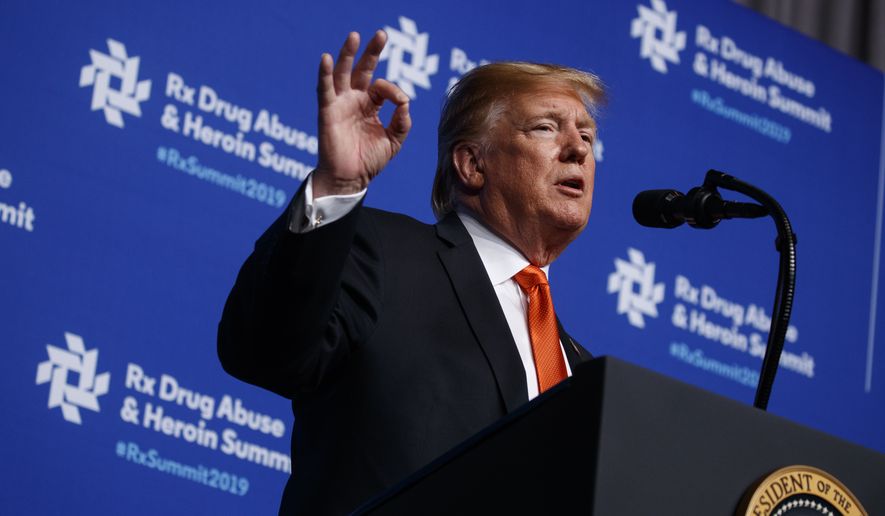The U.S. opioid crisis won’t be solved overnight but progress is being made, President Trump said Wednesday, claiming credit for slashing opioid prescriptions by a third and getting more people into addiction treatment.
Mr. Trump said he expects more improvement as China makes good on its promise to him to reel in fentanyl, a powerful synthetic opioid that is killing tens of thousands of Americans.
“We will never stop, until our job is done, and then maybe we’ll have to find something new,” Mr. Trump told the Rx Drug Abuse and Heroin Summit in Atlanta. “We will succeed.”
The White House says it has seen the number of people receiving medication-assisted treatment for addiction rise 60%, and the number of overdose deaths has flattened out.
States such as New Hampshire, West Virginia and Pennsylvania, which were particularly hard hit, even saw noticeable decreases in overdose deaths over the latest 12-month reporting period from the previous year, according to the administration.
Meanwhile, the number of opioids prescribed dropped by 34% over the first two years of Mr. Trump’s tenure.
“The doctors are working with us. The labs are working. The clinics are working. The pharmaceutical companies are working with us. And we’ve made a tremendous amount of progress,” Mr. Trump told reporters as he left the White House.
The president’s critics said it’s too soon for a victory lap and that he doesn’t deserve credit for gains that have happened on his watch.
Mr. Trump promised to combat opioid addiction during the 2016 campaign, and in his first year in office labeled drug addiction a public health emergency.
Since then, he has urged Chinese officials to crack down on fentanyl as part of trade talks and says his emerging border wall will thwart drug traffickers from Mexico.
The president also signed a mammoth, bipartisan bill last year to stop the flow of synthetic drugs from abroad, expand treatment options and fund non-addictive painkillers.
Keith Humphreys, at Stanford University professor who tracks the opioid problem, said while Mr. Trump signed that bill, it was “the least he could do — literally,” while his public emergency on opioids offered little more than “political theater,” so he can’t claim too much credit for any progress.
“It has been congressional leaders in both parties who have led the policy response to the opioid epidemic,” he said.
Democrats also say his push to undo Obamacare would rob communities of federal dollars they need to get addicted residents into treatment.
Mr. Trump’s supporters say his use of the bully pulpit has paid dividends, however, drawing $6 billion out of Congress to combat the drug crisis.
The White House is encouraging Americans to rein in excess pills by turning in unused prescription opioids Saturday as part of “National Prescription Drug Take Back Day.”
White House counselor Kellyanne Conway lauded Google Wednesday for creating tools that help people find one of 5,500 locations where they can safely dispose of prescription drugs.
First lady Melania Trump said she will continue to battle opioid use among mothers as part of her “Be Best” initiative for families and children.
“Together, we are making real progress to help people recover, to support families, and to heal our nation,” Mrs. Trump told the crowd in Atlanta.
Mr. Trump’s stop in Georgia had the feel of a stump speech at times, with him decrying “weak, pathetic” immigration laws, extolling his economic record and offering support for faith-based initiatives, before pivoting back to addiction.
• Tom Howell Jr. can be reached at thowell@washingtontimes.com.




Please read our comment policy before commenting.